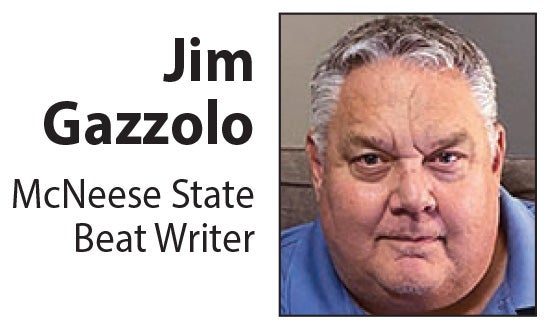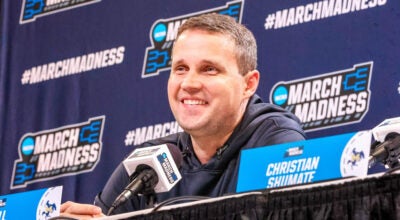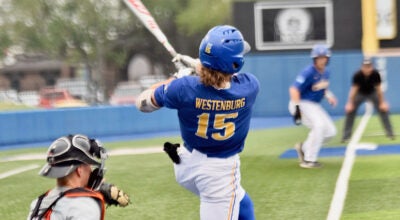Hemphill: McNeese needs to be ready for new landscape
Published 11:40 am Wednesday, February 12, 2014
McNeese State may not be in the eye of the storm swirling around college athletics, but that doesn’t mean it still won’t be caught up in the winds of change that are blowing.
Last month both athletes and the five big conferences made it clear the status quo isn’t working, at least not for them.
Kain Colter led a group of Northwestern football players in the start of a union. That came just days after the five big boys in college conferences told the rest of the university system they wanted more control.
At the center is money.
Both the big Bowl Championship Series conferences and their players want a slice of the pie, or a bigger slice of the pie.
Truth is they want all the treats.
That could leave the rest scrambling for crumbs.
Bruce Hemphill knows this all too well.
The McNeese athletic director may be in his first year at the school, but he has been around long enough to know the landscape is shifting.
“It is coming,” he said recently. “I can’t tell you when and I don’t think it is happening soon, but down the road a lot of things will change.
“Then we will all be waiting for the trickle-down effect.”
Hemphill admitted McNeese must be prepared for whatever happens or suffer the consequences.
“The important thing is we will have to be ready to do what is in the best interest of our school, community and student-athletes at the time we need to make decisions,” Hemphill said.
“There are a lot of things being talked about and a lot of people talking. We are watching it all very closely. We have to be sure that we know what’s going on.”
McNeese would like to be part of the conversation, but as a smaller Division I school that plays in the Football Championship Subdivision, its voice will likely be drowned out when all the shouting really gets going.
“I like the position we are in right now, but we have to worry about ourselves first,” Hemphill said. “We have to take care of what we can do and be ready for what comes next.
“Right now it is important that we be the best McNeese we can be, both on the field and off. We are like everybody else — we have to find ways to raise more money, pay our coaches and get more people to our games.
“Everybody is suffering in some way, but for us it is important that we keep the focus on what we are doing now as well.”
Football is the big dog in this mess, but not the only one. While the Colter group only talked about football it can’t stop there.
Players want to be paid. They no longer consider themselves student-athletes but rather employees of the universities for which they play. Since most of those are public schools, they would actually be employees of the state.
If so, then they would have the same rights as all other state employees.
That final decision will be made in court, mostly likely the Supreme Court to be exact.
“Players want to get paid above board,” Hemphill said. “They see all the money being made out there by everybody else and they aren’t dumb. They want some of it.
“But how much is the question?”
Not only how much, but who gets what must also be answered.
If it is a true union, does it stop at Division I football or go not only to lower levels but also other sports? This could kill lower-profile programs.
“We can’t compete with the big football schools,” Hemphill said. “And you have to look at what that would mean to Title IX and its future.”
Title IX is the federal law that forces public schools to give equal play opportunities for both men and women.
“You just can’t change a federal law,” Hemphill said.
Right now McNeese benefits from kids who would rather play than sit on the bench at say an LSU or even Louisiana-Lafayette. But if the bigger schools starting paying, even those not playing because of the union, the talent pool might dry up a lot quicker.
“I think kids still want to participate, but they also want to make money,” Hemphill said. “They would have more choices and things would get tougher on smaller schools.”
All those issues really lead to one question for McNeese: What level should their football program play at in the future?
Some want it to remain an FCS team while others would like to see it move up into the BCS division like ULL, Louisiana-Monroe and Louisiana Tech.
After all, there is no guarantee the FCS division will look like it does now in the future.
“We really have to take a look at everything that is going on,” Hemphill said. “It is important for people to know we have time and want to make the right decision, whatever that might be.”
The move up has worked for places like ULL, but not until the football program suffered growing pains for years.
“It’s not a simple decision because so much is changing right now,” Hemphill said. “Nothing is settled and nothing is going to be settled. We still have a lot of work to do to get better where we are.”
It is a tough call for school officials. Coaches would have to be paid more, some facilities would have to be updated and the fan base would have to grow.
McNeese drew just more than 5,000 fans to its first home football playoff game in four years last December, a number Hemphill called “very disappointing.”
“We are in a fight for the area’s entertainment dollar and we know that,” he said. “It is harder and harder each year for teams to draw bigger crowds. There is so much else going on not only in the area but with games on television.”
With that in mind McNeese teams have gone out in the public more of late, trying to become bigger parts in an ever-growing and changing community.
“It is important we let people know not only who we are but what we are doing,” Hemphill said.
That may get them a few more butts in the seats, but in the end the future of this school’s athletic program will be decided by not only its own officials but other forces nationally.
Hemphill said he believes that when the big storm finally hits, McNeese will be able to weather it just fine.





